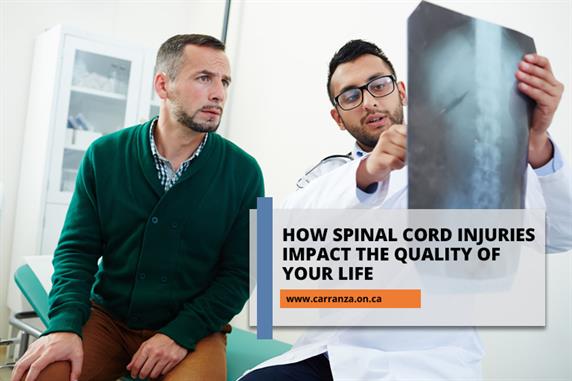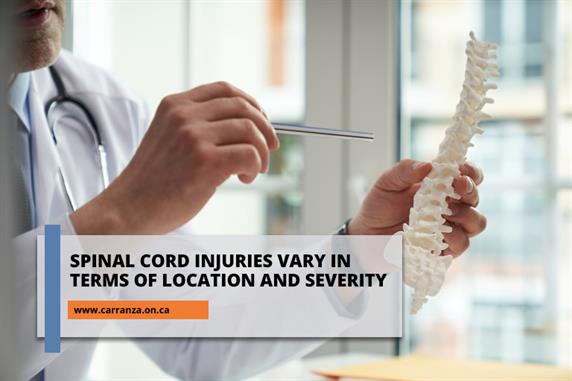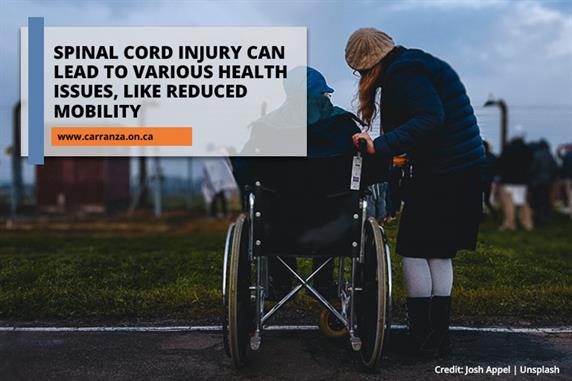
One of the most serious injuries a person can suffer is a spinal cord injury. This type of injury can lead to a lifetime disability, and it is important to understand how it can impact your life.
In this blog post, we will discuss the different types of spinal cord injuries, as well as the effects they can have on your life. We will also provide tips for coping with a spinal cord injury.
What Is a Spinal Cord Injury (SCI)?

A spinal cord injury (SCI) occurs when the spinal cord is damaged and spinal cord function is reduced. This can be caused by a blow to the spine, a gunshot wound, or a severe fall. The result is a loss of function below the point of injury.
In some cases, the paralysis may be partial, but in others, it can be complete. In either case, it can have a profound impact on a person's life. In addition to causing paralysis, an SCI can also lead to chronic pain, respiratory problems, and problems relating to one’s sexual function and bladder control.
The exact spinal cord injury symptoms will depend on the location and severity of the injury. Spinal cord injury treatment typically includes physical therapy and rehabilitation, as well as medications to manage pain and other symptoms. In some cases, surgery may also be necessary. With proper treatment, some people with an SCI are able to lead relatively “normal” lives.
Types of Spinal Cord Injuries
There are four levels of spinal cord injuries, classified according to the location of the injury on the spinal cord.
Incomplete Tetraplegia or Quadriplegia
The first and most common is incomplete tetraplegia or quadriplegia, which is a cervical spinal injury. Incomplete means that there is still some movement and sensation below the level of the injury.
Complete Tetraplegia or Quadriplegia
The second level is complete tetraplegia or quadriplegia, which is a total loss of function and feeling below the level of the injury.
Incomplete Paraplegia
The third level is incomplete paraplegia, which is an injury to the thoracic, lumbar, or sacral levels of the spinal cord. Incomplete paraplegia means that there is still some movement and sensation below the level of the injury.
Complete Paraplegia
The fourth and final level is complete paraplegia, which is a total loss of function and feeling below the level of the injury. Complete paraplegia can also be referred to as Brown-Sequard syndrome.
The Effects of an SCI

Below are some of the ways having a spinal cord injury can impact a person’s quality of life.
Reduced Mobility
A spinal cord injury (SCI) is a catastrophic event. Not only does it cause immense physical pain and suffering, but it can also lead to a loss of mobility. In fact, according to the Christopher & Dana Reeve Foundation, most people with SCI will experience some degree of paralysis.
This paralysis can be complete, meaning that the person has no movement or sensation below the site of the injury or it can be partial, meaning that the person still has some movement and sensation below the injury site. Either way, a loss of mobility can have a profound impact on a person's ability to live a “normal” life.
Things that most people take for granted, like walking, sitting up, or even using the restroom, can become major challenges for someone with a SCI.
Reduced Bladder and Bowel Control
When the spinal cord is damaged, the nerves that control the bladder and bowels may also be affected. This can lead to incontinence, or the inability to hold in urine or feces. In some cases, the person may be unable to feel when their bladder or bowels are full.

As a result, they may experience accidents or leakage. While incontinence can be embarrassing, it is important to seek medical help if you are experiencing this issue.
A doctor can determine the cause of the incontinence and develop a treatment plan to help improve your quality of life.
Fertility Issues
When most people think about fertility, they think about the reproductive organs. However, the spinal cord plays an important role in fertility as well.
The spinal cord is responsible for sending signals from the brain to the reproductive organs, telling them when to produce eggs or sperm.
A spinal cord injury can disrupt this communication, resulting in infertility. In fact, studies have shown that many men with spinal cord injuries are unable to father children naturally. For women with spinal cord injuries, the fertility rate is even lower. This is because a woman's ovaries need to receive signals from the brain in order to release eggs. If the ovaries don't receive these signals, they will stop producing eggs altogether.
While there are some treatments available that can help improve fertility after a spinal injury, such as hormone therapy and assisted reproductive technologies, there is no guarantee that these methods will be successful.
Difficulty Breathing
The respiratory system is controlled by the autonomic nervous system, which is located in the spinal cord. If this area is damaged, it can impair the ability to breathe properly. In some cases, a ventilator may be required to help with breathing.
Temperature Regulation
One of the many functions of the spinal cord is to regulate temperature. It does this by sending messages to the body that tell it to perspire or shiver. When the spinal cord is damaged, these messages can get mixed up or lost entirely, resulting in temperature regulation problems.
One common symptom of a spinal cord injury is hyperthermia, which occurs when the body cannot cool itself down and overheats. This can be extremely dangerous, as it can lead to organ damage or even death.
In contrast, some people with spinal cord injuries may experience hypothermia, which is when the body cannot generate enough heat and becomes too cold. Both hyperthermia and hypothermia can be life-threatening, so it is important for people with spinal cord injuries to monitor their temperature closely and seek medical help if they experience any unusual changes.
Mental Health
It is not uncommon for people with spinal cord injuries to experience depression, anxiety, and post-traumatic stress disorder. The reasons for this are extensive. The loss of physical function can be devastating, leading to feelings of hopelessness and despair.
On top of that, the pain associated with these injuries can be constant and overwhelming, contributing to feelings of fear and isolation. Lastly, the social stigma surrounding these injuries can make it difficult for people to form close relationships with others or to feel accepted by others.
Contact a Personal Injury Lawyer in Hamilton if Your SCI Is the Result of an Accident
Spinal cord injuries can happen in a number of ways. If your injury occurred due to someone else’s negligence, you may be entitled to compensation. Contact our personal injury lawyer today to learn more about how we might be able to help.